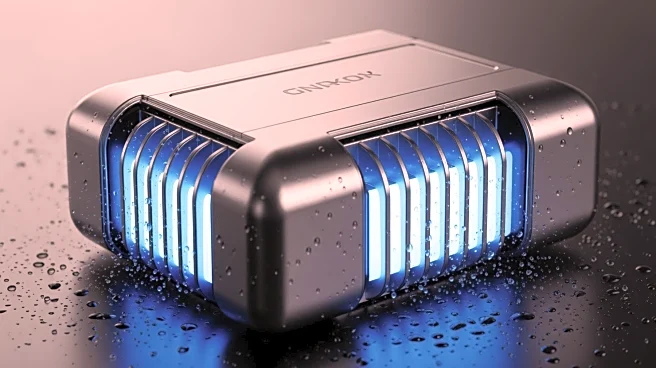What's Happening?
Hydrohertz has introduced a groundbreaking battery cooling technology designed to significantly reduce electric vehicle (EV) charging times. The UK-based company has developed the Dectravalve system, which
offers precise thermal management across multiple zones within a battery pack. This innovation addresses the challenge of uneven heating during high-power charging, a common issue that can lead to reduced efficiency and safety risks. The Dectravalve system independently controls cooling zones, maintaining consistent temperatures and preventing hotspots. Testing with Warwick Manufacturing Group demonstrated that the system could keep cell temperatures below critical thresholds, allowing for sustained high-power charging and potentially reducing charge times by up to 68%. This advancement could bring EV charging times closer to the convenience of refueling traditional petrol vehicles.
Why It's Important?
The introduction of Hydrohertz's Dectravalve technology is a significant development for the EV industry, as it promises to enhance battery performance and safety while reducing charging times. By maintaining optimal cell temperatures, the system improves battery efficiency, potentially increasing driving range by up to 10%. This could translate to an additional 30-40 miles per charge for mid-sized EVs. Furthermore, the technology reduces the risk of lithium plating and thermal runaway, which are critical safety concerns. The ability to extend battery lifespan and improve residual values is particularly beneficial for manufacturers and consumers alike. As the demand for EVs continues to grow, innovations like Dectravalve could accelerate the transition to electric mobility by addressing key barriers such as charging convenience and battery longevity.
What's Next?
Hydrohertz's Dectravalve technology is positioned as a cost-effective upgrade for original equipment manufacturers (OEMs) seeking to enhance existing battery performance without the need for new chemistries. The company aims to offer this solution as a way to improve current EV models while also preparing for future advancements in battery technology. As the automotive industry continues to evolve, OEMs may adopt this technology to meet consumer expectations for faster charging and longer battery life. The widespread implementation of Dectravalve could lead to more competitive EV offerings and potentially influence industry standards for battery thermal management.
Beyond the Headlines
The Dectravalve system's ability to provide independent thermal control across battery zones without complexity or energy loss represents a significant leap in battery design. This innovation not only enhances performance but also future-proofs existing batteries against next-generation technologies. By optimizing thermal management, Hydrohertz addresses a longstanding weakness in EV battery design, potentially setting a new benchmark for safety and efficiency. The closed-loop design prevents thermal contamination and cascading temperature spikes, ensuring consistent performance across the battery pack. As the technology gains traction, it could lead to broader industry shifts in how battery systems are engineered and managed.











